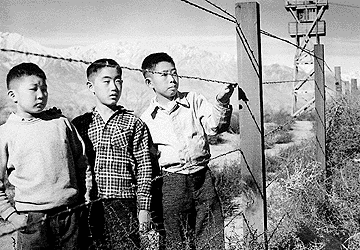
Wednesday, March 10, 2010
The Tuskegee Airmen
The Tuskegee airmen were African American men who learned to fly fighter planes. The route to get there was very hard, if you did not have the qualifications you were let go from the institute of flying. To distinguish themselves from every body else they gave themselves names of the packs. These brave men fought in Italy and they were apart of the all black 99Th pursuit squadron. These airmen contributed great, when in Sicily, the squadron put in there first victory against the enemy aircraft. They went on to do even more impressive war tactics strikes. You Could say that the Tuskegee airmen were great hero's of the war because they did not join the war because they had to, they did if because it was the right thing for this country. I feel that these men were a good reason why we had some many victory's in war in that time period. 

Tuesday, March 9, 2010
Japanese Concentration Camps in America By: Diane

The internment of the Japanese resulted from the bombing of Pearl Harbor. Over 100,000 Japanese, most of whom were actually citizens of the United States, were relocated to various camp sites in the western part of the United States.
The relocation occurred during FDR's presidency during World War II as an act by Congress. Many of the Japanese put into these concentration camps were not of full Japanese decent. Some of them had grandfathers or aunts and uncles that were Japanese. The prejudice turned to discrimination and injustice.
When the Japanese were relocated, all were forced to give up their businesses, homes, shops, farms, and property. They could not take much to the concentration camps. At the camps, many of the families were separated. Food, water, shelter, and clothing mostly consisted of army surplus and was of very low quality. Some young men signed up for the United States Army as Japanese to escape the camps.
It was very hard for the Japanese to rebuild the lives that they had left behind after being freed from the internment camps. It would take and estimated 50 years for them to regain and earn the equivalent of what they had earned. Since their property and businesses had been left for grabs, the Japanese had nothing when they were released and had to start all over again.
The internment of the Japanese portrays that even a country of 'freedom' can act upon prejudice and discrimination in a negative way.
Subscribe to:
Comments (Atom)